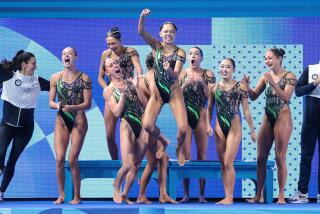A LOOK AT THE OTHER SPORTS...
- Share via
For those who predicted that team handball would rise from obscurity to become a popular sport following the 1984 Olympics Games, guess again.
First, there was Peter Ueberroth, Los Angeles Olympic Organizing Committee President, who predicted that team handball would be “the sleeper sport” of the ’84 Games. He reasoned that the fast-paced, high-scoring game would be perfectly suited for American fans.
Next, there were the followers of the sport, who hoped that TV exposure and some patriotic victories would enlighten the American public and set off a wave of team handball mania.
Then, there was the U.S. Team Handball Federation, which envisioned Olympic spinoffs that would include summer youth camps, universities and colleges supporting club teams and a national headquarters for training and development.
They were all overly optimistic.
In fact, when neither the U.S. men’s nor women’s teams qualified for medal play, ABC seemed to lose interest interest in covering it and the sport--which is a fast-paced game that combines aspects of basketball, water polo and soccer--has yet to catch on.
One year after the ’84 Games, the U.S. women’s team doesn’t have a coach, the men’s team is trying to regroup after losing five key players and, worst of all, the general public remains underwhelmed.
Javier Garcia Cuesta, U.S. men’s coach, who was praised internationally for shaping a group of inexperienced players into a respectable outfit in only three years, is back to square one. He is presently in Baton Rouge, La., to scout and recruit players at the National Sports Festival for both the U.S. men’s and women’s national teams.
Cuesta, a former national player and coach from Spain, received offers to coach the top club teams in Europe following the Olympics. He declined all of them to remain the U.S. coach.
Cuesta will select 20 men and women to train in Colorado Springs beginning in September. The players will train six hours a day, six days a week. A coach is also expected to be named to replace Klement Capliar, U.S. women’s Olympic coach, who was not retained following the Games.
The men’s national team disbanded after the World Championship last February in Oslo, Norway. The men finished 10th among 16 competing countries, but there were some bright spots. They were competitive in losses against world powers such as Hungary, East Germany and Poland. Steve Goss was the fourth-leading scorer in the tournament. Rod Oshita made some spectacular saves in goal.
“We proved that we belonged,” veteran player Michael Lenard said. “We used to have to beg to get into international tournaments. Now, everyone wants us to play.”
Lenard, now a 30-year-old attorney in Los Angeles, said the idea of spending the next three years training in Colorado Springs doesn’t appeal to him.
“It was time to join the real world,” he said. “I wish I was five years younger, because I can see us getting closer all the time. But I won’t be going to Colorado Springs.”
Neither will Olympic veteran goalie Billy Kessler; Goss, or Joe Story. Goss will attending veterinary school at UC Davis and Kessler is hoping to return to Europe to play for a professional club team. Story works for Price Waterhouse and is participating with that firm in the Olympic Job Opportunities Program, which helps to place athletes in full-time positions with flexible jobs that allow time off with pay for training.
More to Read
Go beyond the scoreboard
Get the latest on L.A.'s teams in the daily Sports Report newsletter.
You may occasionally receive promotional content from the Los Angeles Times.






